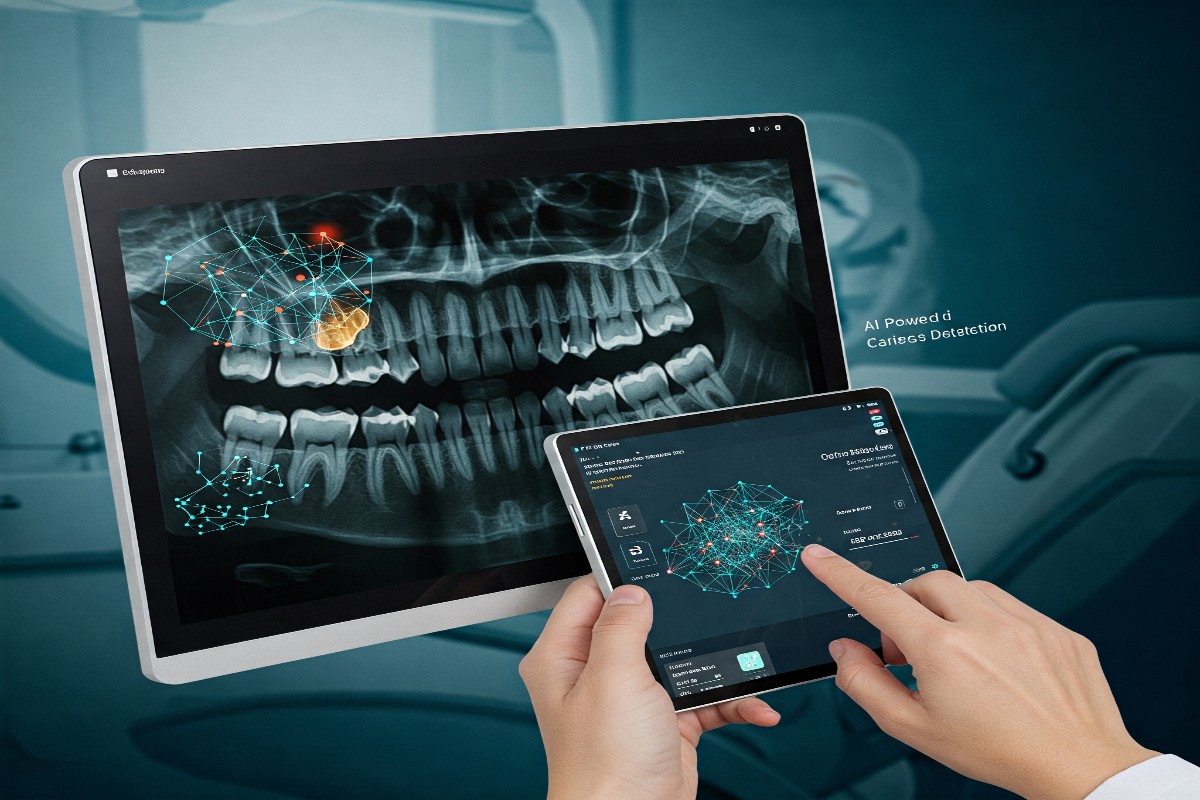

Artificial intelligence (AI) is bringing major changes to healthcare, and dentistry is no exception. AI has significantly improved the field of dentistry, leading to more reliable and quicker procedures for prevention and diagnostics. It especially assists dentists when they need to make important decisions right away. As a result, there are fewer chances for mistakes and patients get the same quality of care every time, making life easier for both dentists and patients.
Oral health evaluation is done using several factors in combination which includes clinical tests, patient history, X-rays, and on occasion, saliva and microbe analysis. It supports understanding of the overall oral health, finding potential risk, and providing the best treatment option.
Yet, the main part of determining oral health is still largely dependent on subjective evaluations, leading to variability in diagnoses and treatment outcomes. It is here that AI in dentistry plays a role, by giving standard insights backed by data that helps avoid misdiagnosis and foster uniform treatment across cases.

Dental caries are still among the most common dental problems found all over the world. Although visual inspection and radiography are widely used, they can produce inaccurate results. Improper interpretation of X-rays may lead to faulty treatment. Thanks to AI’s image enhancement, it is now easier to diagnose several dental issues at an early stage.
CariesNet is an artificial intelligence model aimed at making the process of detecting dental caries easier. It is built on a convolutional neural network (CNN) architecture which analyzes dental radiographs and reliably detects dental caries using AI and machine learning.
A popular study by Hung M. et al. stated that:
o 97.1% success rate
o 95.1% precision
The sensitivity in detecting root caries with machine learning was over 99%.
Periodontitis is the second most common dental problem after dental caries. Many people do not realize they have periodontitis until it has advanced.
Application of AI models such as CNNs to periapical and panoramic radiographs has shown great results. CNNs were shown to assess bone levels, find attachment loss, and track changes in the disease. With the help of these tools, dentists could make projections for Periodontally Compromised Teeth (PCT), simplifying their planning for treatments.
Delay in diagnosis is a main reason why oral cancer can be so deadly. AI-based tools for assessment have proven they can identify tissue conditions early using digital scans.
Oral Oncology recently highlighted how AI can assess images from the mouth, autofluorescence images, and slides of tissue samples.
Achieving results with deep learning, the accuracy in telling apart benign, premalignant, and malignant lesions was above 90%.
AI systems can also:
AI is increasingly being connected to Electronic Health Records (EHRs). Mixing AI with EHR systems results in a single platform to examine oral health risk factors. Analysing records from patient records and looking at social habits (such as smoking and diet) together with genes, AI can create a personal risk score for each disease.
These models become especially valuable in:
The use of salivary biomarkers is rising in discovering diseases of the mouth and elsewhere in the body.
Researchers have developed AI models that understand saliva samples to look for biomarkers in relation to:
By merging biomarker, clinical, and life pattern data, the health assessments are very tailored and may help find signs of disease before symptoms develop.
1. Enhanced Diagnostic Accuracy: The risk of mistakes made by humans is minimized, particularly at the stages of examining X-rays and detecting disease.
2. Standardized Assessments: Patient assessments are carried out with the same quality at each facility and by every provider.
3. Real-Time Decision Support: AI software makes it easy for clinicians to process information and come to good decisions immediately at the dental chair.
4. Cost and Time Efficiency: AI in dentistry helps doctors automate some responsibilities, so they can talk more with patients and organize their care.
5. Preventive and Personalized Care: Because AI can tell us what might happen in the future, early action and customized care plans can be given to patients
Despite its potential, AI in dentistry faces several challenges:
o Protection of patient data
o Bias in training datasets: If diverse data is used to train AI models, it helps guarantee equity and prevents mistakes.
o Clinical adoption: It is important for dentists to have training in AI tools so they can start using them on a regular basis.
o Regulatory hurdles: AI applications should go through both clinical testing and be approved by regulatory boards (such as the FDA, CE-marking).
As we have more data and stronger algorithms, AI will take on a wider role in oral health assessment, acting as helpful enhancers to what dental experts do.
Future directions include:
o AI-guided robotic procedures
o Fully integrated chairside diagnostic systems
o Voice-assisted dental charting
o AI-enhanced tele-dentistry for underserved populations
AI in dentistry is having a major effect on how we assess, detect, and manage problems of oral health. There are many ways AI helps dentistry, from making patient outcomes better, offering personalized care, to providing accurate test results and forecasting outcomes. We should not see using AI in oral health evaluation only as an option for the future. More specifically, it is a way to provide better, smarter, and more accurate care for your teeth.
One such blessing for dentist is the scanO AI air and scanO AI engage which makes oral health exams easier and more accurate by using artificial intelligence. It allows us to take a scan of oral cavity under 2 minutes and provides a visual report which helps the patient to understand the disease and also helps the doctor to explain the disease progression and treatment plan to the patient.
With technology built into dental care, scanO is working to ensure everyone can enjoy accessible and efficient preventative oral health.
scanO is an AI ecosystem transforming oral health for patients, dentists, corporates, and insurers worldwide

© 2025 Trismus Healthcare Technologies Pvt Ltd